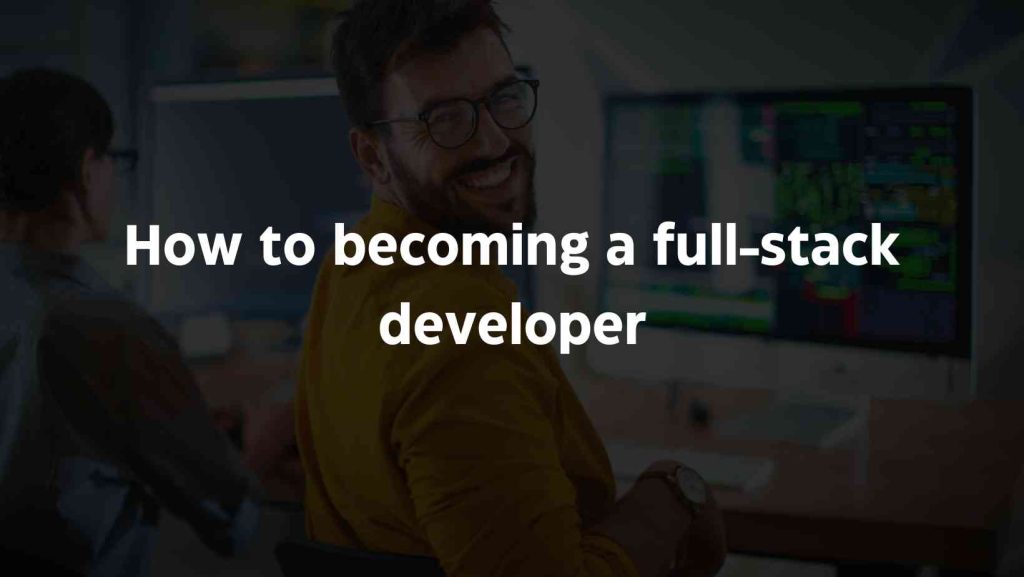To become a Full Stack Developer
Becoming a Full Stack Developer is a rewarding goal, but getting there takes hard work, persistence, and a willingness to learn. This in-depth manual will walk you through everything you need to know to become a competent full-stack developer. This article will provide you with the tools you need to succeed, from a firm grasp of the principles to experience with cutting-edge technologies. Come on, then; let’s get started.
Programming Front-End:
3.1.1 HTML and CSS:
The foundation of any website is laid with markup languages like HTML and style sheets like CSS. Web pages are organised by HTML, and their appearance is managed by CSS. Learning HTML and CSS fundamentals can help you build user-friendly and aesthetically pleasing websites.
Sources:
W3Schools’ HTML Guide: link
CSS Tutorial in the MDN Web Docs: link
3.2 JavaScript:
JavaScript is a robust programming language that enables websites to have dynamic interactivity. It’s crucial for front-end development since it lets you make interactive elements, respond to user events, and modify data on the client side.
Sources:
MDN Web Docs for JavaScript: Link
3.3 Front-End Frameworks
Front-end frameworks like React, Angular, and Vue.js offer a methodical approach to developing feature-rich websites. Benefits of using such frameworks include improved performance, better data management, and the ability to reuse components.
Sources:
Response: Official References:
Official Angular Documentation: Link
The Official Vue.js Guide:
Development in the Backend:
4.1 Languages Used for Coding on the Server:
You may construct the logic and functionality that drive online applications with the help of server-side programming languages like Python, Ruby, Java, and Node.js. Pick a language that supports your goals and is appropriate for the task at hand.
Sources:
Python Reference: Official Docs
Ruby’s Official Docs: click here
This is the official Java documentation: link
Link to the Official Node.js Documentation: click here
4.2 Databases:
For full-stack development, knowledge of databases is essential. You should feel comfortable working with both relational and NoSQL databases. NoSQL databases, such as MongoDB and Firebase, are preferred for flexible and scalable data storage, whereas relational databases, such as MySQL and PostgreSQL, are recommended for storing structured data.
Sources:
MySQL Reference Guide: link
Link to PostgreSQL Online Docs: link
Reference Guide for MongoDB: link
Firebase Reference Guide: click here
4.3 API Development
The development of application programming interfaces (APIs) facilitates information sharing and collaboration across disparate computer programmes. As a full-stack developer, you’ll frequently interact with APIs to add new features and services to your apps. Master frameworks like Express.js and the Django REST framework to learn how to design, build, and use APIs.
Sources:
Express.js Reference: here
Link to Django’s documentation of the REST Framework : link
5. Management of Multiple Versions and Teamwork:
When it comes to keeping track of and managing modifications to your codebase, version control systems like Git are indispensable. Teamwork and effective project management necessitate familiarity with Git and its associated tools, including forks, merges, and collaborative platforms like GitHub and GitLab.
Sources:
Git Reference Manual: click here
Reference: GitHub’s How-To Documentation : link
6. DevOps and Application Deployment:
DevOps procedures entail automating the application creation, testing, and release phases of software development. Learn about containerization techniques like Docker and CI/CD (continuous integration/continuous deployment). Master the process of releasing software to AWS, Azure, or Heroku in the cloud.
Sources:
Docker Reference: click here
Amazon Web Services Docs: click here
Reference Material for Azure: click here
Reference Guide for Heroku: click here

7. Continuous Learning and Professional Development:
Success as a Full Stack Developer requires a dedication to lifelong education. Follow prominent blogs, join active online forums, and go to industry-related events to keep up with the latest developments. If you want to stay ahead of the competition, you need to always be learning and adapting.
Practise what you’ve learned by constructing projects that have real-world implications. Initiate projects at a low complexity level and work your way up. Participating in construction projects can help you develop technical expertise, problem-solving skills, and a portfolio to show off to prospective employers.
8. Participate in forums
join coding communities, and make contributions to open-source projects to become an active member of the developer community. By working with others and exchanging information, you can gain exposure to the expertise of more seasoned programmers and grow your network of contacts in the industry.
The road to becoming a full-stack developer is an interesting and fruitful one. You may establish yourself as a capable full-stack developer if you have mastered front-end and back-end technologies, version control, deployment methods, and ongoing education. Remember that staying curious, practising often, and accepting change are crucial for success in this subject.
Start your research for your journey with the materials we’ve supplied. Maintain dedication, keep at it, and take pride in your progress towards becoming an expert Full Stack Developer. All the best!



